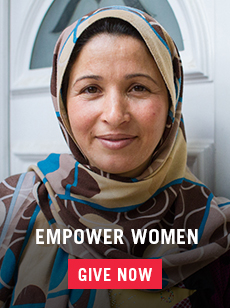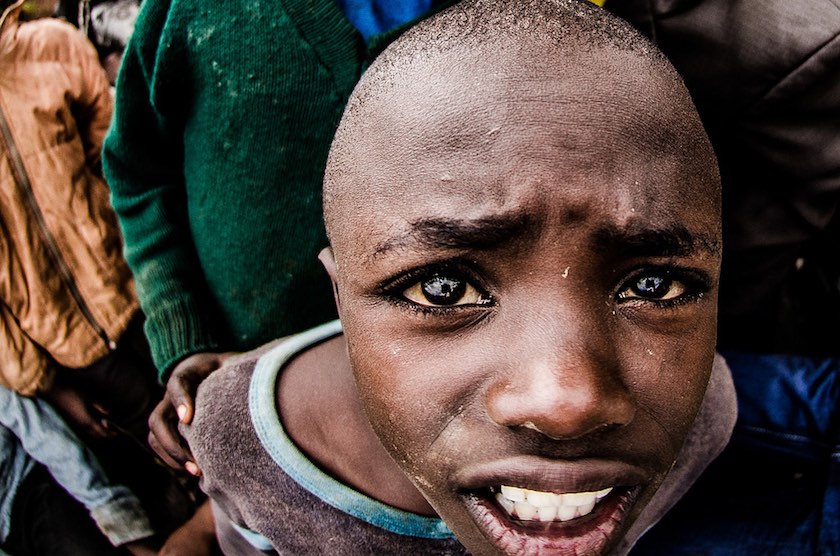We’ve all heard it.
A speaker gets up on stage and shows you photos of a child with flies on his face or a swollen stomach. It’s horrible. But it’s also real. The desperation you feel looking into the eyes of that child is real. And then the speaker, knowing there’s a knot in your stomach, swoops in…
“If this were your child, you wouldn’t even bat an eye to save his life.”
“With all our wealth and our Starbucks, we can’t even imagine what these poor people are going through.”
“Americans will spend billions on things they don’t need this Christmas, but she just wishes she had some food.”
Guilt. Tyrannical, puritanical guilt.
It may be manipulative, but it works. When people don’t want to go with you willingly, guilt has a way of dragging them along.
Bernard Ross, co-author of the book The Influential Fundraiser, acknowledges the power of guilt, but he says that ultimately it doesn’t engage people in a healthy way. “It’s a knee-jerk response,” he writes. “And it then becomes a contest of how emaciated can you make a child look. Like any drug, you have to turn up the emotion to get a reaction from people.”
Guilt may work in the moment, but we don’t just need to act for a moment. People need us all-in, sold out to remaking the world—day in, day out!
To do that, we have to move beyond guilt, because it can only take us so far.
Guilt makes our giving about us and how we feel. Donating or volunteering just to medicate against our own guilt is like swallowing a generosity pill to get rid of a headache—and we know refugees and their problems are not headaches to be banished!
Many of you who are reading this are already invested. In a sense, I’m preaching to the choir. You’ve helped save lives, and you aren’t in this to assuage your guilt or to self-aggrandize. You’ve helped ISIS victims rebuild their lives. You’ve helped them rise above the word “victim” and ensure ISIS doesn’t get the last word.
You are bought in.
But why? Why are you bought in? What motivates you to give? What gets someone fired up to jump in and love where others won’t?
“Guilt leads to avoidance.“
If your initial motivation is guilt, that’s OK! But how do we move beyond guilt toward something positive and lasting? How do we encourage others to do the same? How do we grow into the kind of people who give of themselves and their money not to get rid of a knot in our stomachs but out of love, hope, and a sincere belief that things can get better?
We don’t have all the answers, but we’re pretty sure guilt isn’t the best way to inspire action. Here are three alternative motivators for us to lean into:
1. Relationships.

Giving money should mark the beginning of something, not its conclusion or dismissal. When our team in Iraq invests money in a new project or helps a mother start a soap business, we do so to initiate a relationship with them. We don’t just say, “Here’s your money. Be well, and don’t bother us again.”
Likewise, when you give money, it should come with a desire to also give of yourself, your time, and talents. When guilt is the primary motivator, relationship takes a back seat, because we’re more worried about feeling better than connecting with people. Guilt leads to avoidance.
We want to journey with you. We want to be in conversation, exchanging ideas with each other. We want you to influence us and the people we’re serving. To do that well—to have a healthy relationship—guilt cannot be the primary motivator. That’s love’s job!
2. Dignity.
We remain convinced that people—no matter who, where, or when—have inherent dignity and worth. Viewing those we serve through a lens of guilt undermines their dignity and inherent beauty. If we depict people as sad, disheveled, and helpless, we do them—and you—a disservice. To do so would contribute to an unhelpful stereotype. It would keep them frozen in a perpetual state of poverty.
The truth is, these people are heroes who are rebuilding their lives. You are helping them do this—but you and I, we are not the ultimate heroes! Our part is to believe something better—to give of our time and money to make sure these mothers, fathers, and children can become the heroes of their own stories, not dependent on us.
Guilt makes people unwillingly dependent on each other. It cannot free them to be heroic, to love and serve willingly.
3. Joy.
Guilt may offer a quick fix for those who feel badly about something they saw on TV, but the rush we get from knee-jerk giving will be superficial. It doesn’t last. In an age of gnat-like attention spans chasing countless shiny objects, it can be very difficult for any of us to experience depth and focus. But it is critical if we’re going to experience joy in our giving, be it financial or otherwise.
We know how great it can sound to say we’ve helped feed a million refugees or start 500,000 new businesses, versus helping 50 displaced families. But you know what happens when we go deep with those 50? Joy—the kind that can only come from a relationship that goes beyond guilt, beyond the reactionary quick fix.
More than that, their businesses are much more likely to succeed, to last, and to serve their communities for generations to come.

I hope you will go deep with us over the long haul. I hope you’ll stick around, so we can get to know one another and these incredible people we’re learning how to love! I guarantee you: if we dive in with our time, our money, and our whole self to addressing a particular issue or serving a particular group, we will experience depth that leads to greater joy.
We’ll move beyond guilt, and everyone will be better for it.
What do you think? What did we miss? This is a huge topic, and we’d love to hear your thoughts on it! Comment below share a thought or a story on why you give.
Photo by Evandro Sudre / CC BY-NC 4.0


